18.11.12 Jazz FOR SAle [III.]
| Kedy |
18. 11. 2012 od 19:00 do 22:00 |
|---|---|
| Kde | Košice, Historická radnica |
| Vstupné |
za |
| Autor | Gabriel Horal |
| Kontaktný tel. | 055-622 04 21 |
JazzPlaysEurepe Laboratory (EU)
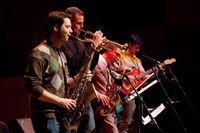 Seven musicians and composers from seven European countries (Poland, Germany, Belgium, Netherlands, Slovakia, France and Luxembourg) will go to Amsterdam for a week in November in order to work together on a new material. Fruits of this labour will be heard soon in Wrocław and six other European cities. Previous two editions of the lab were a very great success. A role of great importance within JazzPlaysEurope plays the cooperation with the Ruhr — the European Capital of Culture 2010.
Seven musicians and composers from seven European countries (Poland, Germany, Belgium, Netherlands, Slovakia, France and Luxembourg) will go to Amsterdam for a week in November in order to work together on a new material. Fruits of this labour will be heard soon in Wrocław and six other European cities. Previous two editions of the lab were a very great success. A role of great importance within JazzPlaysEurope plays the cooperation with the Ruhr — the European Capital of Culture 2010.
Willis - Kaltenecker - Borlai (Hu, USA)
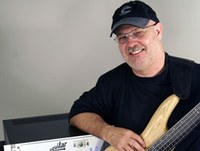 Gary Willis’s latest project, Triphasic, got its start in 2008 and saw the release of “Shaman” later in the year. The eclectic-electric trio features Llibert Fortuny on tenor sax, electronics and vocal effects as well as David Gomez on drums and electronic percussion. Willis’s latest explorations have been focused on bringing a synchronized visual experience to the trio’s live performances. This new development finds Willis occupying the VJ controls at the same time navigating the electronic sequences that the band improvises to.
Gary Willis’s latest project, Triphasic, got its start in 2008 and saw the release of “Shaman” later in the year. The eclectic-electric trio features Llibert Fortuny on tenor sax, electronics and vocal effects as well as David Gomez on drums and electronic percussion. Willis’s latest explorations have been focused on bringing a synchronized visual experience to the trio’s live performances. This new development finds Willis occupying the VJ controls at the same time navigating the electronic sequences that the band improvises to.
In 2007, Gary Willis relaunched his solo and bandleader career with the release of “Actual Fiction” and the avant-jam-trio “Slaughterhouse 3“. Early reviews of “Actual Fiction” describe that it’s “everything you’ve ever liked about his work with Tribal Tech and leaps forward a few light years.” while being “wide open from the very first note and will test your neck vertebrae with the powerful rhythms all through this recording.” Allaboutjazz.com describes “Slaughterhouse 3″ as “Undoubtedly funky and at times lyrical, the music on Slaughterhouse 3 is also nicely edgy, exploring some dark and heavy musical avenues. Willis, Covington and Fortuny all excel on a fascinating album which will hopefully be only the first of further collaborations together.”
Through the years Willis has played with musicians like Wayne Shorter, Allan Holdsworth, Hubert Laws, Simon Phillips, Joe Diorio, Robben Ford, and Pil Upchurch, as well as being the co-leader of Tribal Tech. In sixteen years of co-leading Tribal Tech with guitarist Scott Henderson, the band produced nine critically acclaimed CD’s, (the last one, “Rocket Science”, was released in 2000) Willis launched his solo career with the September 1996 release of “No Sweat”, featuring incredible performances by Dennis Chambers on drums, Scott Kinsey on keyboards, and Steve Tavaglione on woodwinds and EWI. For the 1998 follow up “Bent”, in addition to Chambers, Kinsey and Tavaglione, Willis added the fiery tenor of Bob Berg and long time Tribal Tech cohort/drummer Kirk Covington. Bent lives up to its title and takes the “rules” of jazz, through dynamic compositions and rhythm-defying improv, and bends reality to fit the talent of easily the most musically monstrous lineup on the scene today. Despite its all-star cast, any listener expecting the self-indulgent “chopfest” is instead treated to great musicians playing tastefully, musically and unselfishly.
As of 2004, Willis became a Barcelona, Spain resident and spends part of his time as a professor of composition, arranging, improvisation and bass at Barcelona’s prestigious Escola Superior de Musica de Catalunya conservatory. The Texas native studied arranging and improvisation as part of the legendary jazz program at North Texas State University. It was there that he switched to bass after years of guitar & bass study. After moving to Los Angeles in ’82 he became a course leader at Musicians Institute in Hollywood and taught at the prestigious California Institute of the Arts in Valencia, California. In 1993, Warner publications released “Bass Lessons with the Greats”, which includes a chapter on Willis’s unique approach to improvisation. His hour-long educational video entitled “Progressive Bassics” features discussion of his technical and fingerboard harmony concepts. In 1998 [Hal Leonard Publishing Co] published his “Fingerboard Harmony for Bass”. Adding to the Willis publishing catalog, Hal Leonard Publishing Co offers “The Gary Willis Collection”. The book features 11 transcriptions of original Willis tunes, including the contemporary classic The “Necessary Blonde”, which is one of two compositions also included in Sher Music’s “The New Real Book-Volume Two”. Two other compositions from his solo recordings are also featured in the ” All Jazz Real Book”, “It’s Only Music” and “The Everlasting Night” also from Sher Music. In Jan. ’99 Hal Leonard released “Ultimate Ear Training for Guitar and Bass”. Bass Player calls it an “excellent method to help you develop your ears and connect them-through your hands-to your instrument.” In demand as an educator, He’s conducted clinics and master classes in over 21 different countries. The latest Willis book from Hal Leonard, “101 Tips for Bass” , was released in 2002 and provides valuable how-to insight that bassists of all styles and levels can benefit from.
In 1999, Ibanez Guitars introduced the Gary Willis Signature Bass. In development for almost 2 years, the Willis Bass offers bassists the chance to purchase the bass built to Willis’s exacting specifications, and an opportunity to get that “Willis sound.” The bass has evolved over the years with subtile improvements, but the latest, most striking change is that now the bass is hand-crafted from start to finish and in Willis’s words: “Instead of trying to make this bass more affordable, Ibanez has decided to make it perfect”
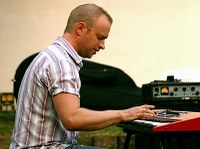 Kaltenecker je staré meno rodiny Zsolta Kutasa. Kompozične do autorskej dielne prispievajú všetci členovia skupiny. O Kaltenecker Triu recenzisti napísali."Témy sú neuveriteľne ťažké, polymetrické modely s nekonečnými sólami sú bezchybné, precízne v každom takte." Skupina ,ktorá na Bratislavských Jazzových dňoch postavila na nohy celé PKO.
Kaltenecker je staré meno rodiny Zsolta Kutasa. Kompozične do autorskej dielne prispievajú všetci členovia skupiny. O Kaltenecker Triu recenzisti napísali."Témy sú neuveriteľne ťažké, polymetrické modely s nekonečnými sólami sú bezchybné, precízne v každom takte." Skupina ,ktorá na Bratislavských Jazzových dňoch postavila na nohy celé PKO.
Zsolt KALTENECKER 1970 /klavír/ - je absolventom Katedry jazzového klavíra Univerzity F.Liszta. Klavír študoval u Jaki Byarda z Manhattan School of New York. Od roku 1992 vyučuje klavír v Budapešti. Pre svoje prvé CD Music Box/1994/ si napísal a nahral sólové klavírne skladby.
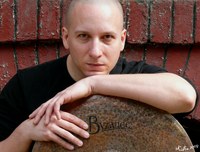 Gergö BORLAI 1978 /bicie/ - na bicie hrá od svojich 3 rokov / ! /. Spolupracoval s takmer všetkými významnými maďarskými hudobníkmi - L.Dés, G.Babos, B.Zsoldos, B."Szakcsi"Lakatos, G.Jinda, G.Presser. Účinkoval v skupinách The Tin-Tin Quartet, In Line Orchestra. Doteraz participoval na 44 albumoch. Je označovaný za "bubenícky fenomén" maďarskej etnickej a jazzovej hudby a Béla Zsoldos, profesor bicích nástrojov na Univerzite v Budapesti, sa vyjadril, že takýto talent sa rodí len raz za sto rokov.
Gergö BORLAI 1978 /bicie/ - na bicie hrá od svojich 3 rokov / ! /. Spolupracoval s takmer všetkými významnými maďarskými hudobníkmi - L.Dés, G.Babos, B.Zsoldos, B."Szakcsi"Lakatos, G.Jinda, G.Presser. Účinkoval v skupinách The Tin-Tin Quartet, In Line Orchestra. Doteraz participoval na 44 albumoch. Je označovaný za "bubenícky fenomén" maďarskej etnickej a jazzovej hudby a Béla Zsoldos, profesor bicích nástrojov na Univerzite v Budapesti, sa vyjadril, že takýto talent sa rodí len raz za sto rokov.
Zuzana Lapčíková Quintet (Cz)
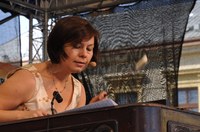 Zuzanu Lapčíkovou známe jako virtuosní cimbalistku, osobitou zpěvačku a skladatelku, jež se nejen díky rodinnému zázemí začala hudebně rozvíjet na poli moravské lidové písně a hudby. Během tovaryšských let hrála a nahrávala s mnoha moravskými cimbálovými muzikami, Brněnským rozhlasovým orchestrem lidových nástrojů, různými komorními seskupeními i orchestrálními tělesy. Její diskografie dnes čítá přes 35 titulů. Při muzikantských rozpravách se setkala s řadou neméně zajímavých osobností, Emilem Viklickým, Jiřím Pavlicou, Idou Kelarovou, Josefem Fečem a dalšími. V roce 2000 přijala pozvání George Mráze k natáčení mimořádně oceňovaného CD „Morava“ v N.Y.C. (s Billy Hartem a Emilem Viklickým). V roce 2002 vystoupila na Pražském jaru jako host George Mráze, kde si zahrála i s ostatními členy George Mráz Quartet (Richie Beirach, Rich Perry a Lewis Nash). Díky svojí otevřenosti vůči hudebním podnětům Zuzana Lapčíková překročila hranice folklórního žánru a vstoupila na pole artificiální hudby a mezižánrových propojení. V roce 2005 vytvořila pro Národní divadlo v Brně hudebně taneční autorský projekt představení pro balet. Výsledné představení „Balady“ bylo renomovanými kritiky vyhlášeno za baletní inscenaci roku v ČR, za hudbu byla nominována na cenu Alfréda Radoka 2006 a získala prestižní Cenu za autorské dílo v rámci Soutěžní přehlídky současné taneční tvorby 2008. Dalším významným milníkem na hudební pouti umělkyně se stal rok 2007, kdy iniciovala vznik nového ansámblu „Zuzana Lapčíková Kvintet“.
Zuzanu Lapčíkovou známe jako virtuosní cimbalistku, osobitou zpěvačku a skladatelku, jež se nejen díky rodinnému zázemí začala hudebně rozvíjet na poli moravské lidové písně a hudby. Během tovaryšských let hrála a nahrávala s mnoha moravskými cimbálovými muzikami, Brněnským rozhlasovým orchestrem lidových nástrojů, různými komorními seskupeními i orchestrálními tělesy. Její diskografie dnes čítá přes 35 titulů. Při muzikantských rozpravách se setkala s řadou neméně zajímavých osobností, Emilem Viklickým, Jiřím Pavlicou, Idou Kelarovou, Josefem Fečem a dalšími. V roce 2000 přijala pozvání George Mráze k natáčení mimořádně oceňovaného CD „Morava“ v N.Y.C. (s Billy Hartem a Emilem Viklickým). V roce 2002 vystoupila na Pražském jaru jako host George Mráze, kde si zahrála i s ostatními členy George Mráz Quartet (Richie Beirach, Rich Perry a Lewis Nash). Díky svojí otevřenosti vůči hudebním podnětům Zuzana Lapčíková překročila hranice folklórního žánru a vstoupila na pole artificiální hudby a mezižánrových propojení. V roce 2005 vytvořila pro Národní divadlo v Brně hudebně taneční autorský projekt představení pro balet. Výsledné představení „Balady“ bylo renomovanými kritiky vyhlášeno za baletní inscenaci roku v ČR, za hudbu byla nominována na cenu Alfréda Radoka 2006 a získala prestižní Cenu za autorské dílo v rámci Soutěžní přehlídky současné taneční tvorby 2008. Dalším významným milníkem na hudební pouti umělkyně se stal rok 2007, kdy iniciovala vznik nového ansámblu „Zuzana Lapčíková Kvintet“.
Už téměř dvacet let se ve Zlíně a Uherském Hradišti zároveň věnuje pedagogické činnosti, výuce hry na cimbál dětí, studentů i dospělých. V roce 2007 se stala spoluzakladatelkou Slovácké základní umělecké školy v Uherském Hradišti, kde v současnosti vyučuje hře na cimbál.
Kuba Stankiewicz Quartet (Pl)
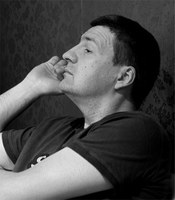 KUBA STANKIEWICZ made his professional debut with the Jan "Ptaszyn" Wróblewski group and the Zbigniew Namyslowski ensemble (1985 - 1987) with whom he recorded two albums: Open and Song of Innocence and performed in the USA and Mexico.
KUBA STANKIEWICZ made his professional debut with the Jan "Ptaszyn" Wróblewski group and the Zbigniew Namyslowski ensemble (1985 - 1987) with whom he recorded two albums: Open and Song of Innocence and performed in the USA and Mexico.
From 1987 until 1990 he studied at Berklee College of Music (diploma in piano performance) and toured across the USA with "The Artie Shaw Orchestra".
He was a recipient of the "Oscar Peterson Award" and semi-finalist of "The Thelonious Monk International Jazz Piano Competition" in Washington, DC.
After coming back to Poland he led his own quartet. His album Northern Song was voted the best Polish jazz recording in 1993 by "Jazz Forum" magazine.
Also his two albums of "Traveling Birds Quintet" (with Darek "Oles" Oleszkiewicz, Piotr Baron, Piotr Wojtasik and Cezary Konrad) were well received by critics.
Kuba Stankiewicz played with Art Farmer (CD Art in Wroclaw), Scott Hamilton, Sheila Jordan and Harvie Swartz among others.
He is a member of the international group Central European Jazz Connection.
Kuba Stankiewicz teaches a piano class at the Jazz Department of the University of Zielona Gora (Poland).
He is also an Apple Certified Logic Pro 9 trainer.
In May 2009 he received a doctorate/Ph.D. title at the Academy of Music in Wroclaw (Poland)

